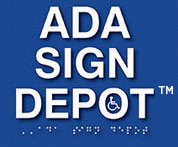ADA Reform Legislation Gains Momentum
ADA Sign Depot
January 27, 2016

California ADA Reform Legislation Gains Momentum
January 22, 2016
Two pieces of legislation meant to dampen predatory lawsuits brought under the guise of helping disabled people are making progress in Sacramento, both winning rare unanimous support in committee votes on Thursday.
Neither represents the meaningful reform that three local lawmakers sought to champion last year. But both bills show signs of the Legislature finally acknowledging that small businesses have been unfairly targeted by shakedown claims from professional victims.
“It is certainly true that a handful of highly litigious plaintiffs have targeted small businesses, especially those without the financial resources and sophistication to challenge such lawsuits,” says an analysis on Senate Bill 269, co-authored by Democratic Sen. Cathleen Galgiani of Manteca. Republican Assemblywoman Kristin Olsen of Riverbank signed on as well, and Assemblyman Adam Gray, D-Merced, intends to do likewise.
Analyses for that bill – and another less aggressive one authored by Olsen, Assembly Bill 54 – quote from 2014 special reports by The Modesto Bee and Merced Sun-Star, which jointly investigated a wave of predatory legal challenges washing over the Northern San Joaquin Valley. More than 60 businesses were slapped with lawsuits in the name of making life easier for the disabled, while some defendants, including Ripon’s Barnwood Restaurant and Ming’s in Los Banos, closed rather than fight in court or buckle to settlement demands for tens of thousands of dollars.
239 ADA lawsuits or demand letters filed each month, on average, in 2015
“Some of these suits are brought by plaintiffs for personal financial benefit, not out of a desire to improve access for disabled consumers,” the SB 269 document says. That sort of language signals a slight change, reform supporters say, in verbiage otherwise weighted toward the status quo backed by the federal Americans with Disabilities Act.
“This is the first time that the Legislature as a whole is really recognizing that abusive ADA lawsuits exist, and that there are lawsuits that are more about money than justice,” said Kim Stone, president of the Civil Justice Association of California.
Plaintiffs include Robert McCarthy, an Arizona man who has sued California businesses for 14 years, The Bee found, except when incarcerated on child pornography and fraud convictions. He sued 14 businesses in Stanislaus and Merced counties in 2013 and 2014, but none of the 28 federal-court lawsuits he filed in 2015 were local.
What’s going on is criminal.
Assemblyman Adam Gray
“What’s going on is criminal,” Gray said in a recent interview, charging that the status quo “sets up a half-dozen law firms to steal from people.”
Last year, Olsen, Galgiani and Gray all introduced ADA reform bills with controversial “right to cure” provisions giving businesses time to fix violations. Facing stiff opposition, Gray and Galgiani withdrew theirs; the Legislature eventually passed a version of Olsen’s after it was watered down, but Gov. Jerry Brown vetoed it in October because it contained a $250 tax credit for businesses making improvements.
Brown also vetoed another bill authored by Sen. Richard Roth, D-Riverside; most of it was resurrected a couple of weeks ago as SB 269, which would give businesses with less than 50 employees 120 days to make minor repairs. It was approved Thursday by the Assembly Judiciary Committee on a 10-0 vote and hearings are expected next week in the Assembly Appropriations Committee.
“ADA reform has to remain a top priority,” Olsen said in a recent interview. “Abuse is wreaking havoc on small businesses.”
Abuse is wreaking havoc on small businesses.
Assemblywoman Kristin Olsen
But SB 269’s protections would apply only to businesses with the foresight to spring for inspections by a certified access specialist, and only certain “technical violations,” such as faded paint on parking lot stripes and the color of disabled parking spot signs, would be included. All protections could be canceled if the bill’s provisions eventually are deemed to conflict with the higher federal law.
Also advancing Thursday, on a 17-0 vote in the Appropriations Committee, was Olsen’s AB 54, co-authored by Gray. It would require those suing to report certain information in a standard format to the California Commission on Disability Access.
Meanwhile, efforts to put two ADA reform initiatives before California voters have been filed with the state. It’s not clear whether either has the financial backing needed for signature gathering to qualify for a ballot.
The status quo “is a dream come true for lawsuit-happy lawyers,” said Andrew Rauch, whose group is called Let’s Solve Access.
The number of ADA-based lawsuits and letters threatening lawsuits in 2014 came to 3,468, the California Commission on Disability Access reported. From 2012 to 2014, two law firms were responsible for 54 percent of such lawsuits.
312 ADA lawsuits filed in California, first quarter 2013
676 ADA lawsuits filed in California, first quarter 2015
“Small businesses are justifiably fearful and angry about being sued,” says the SB 269 analysis.
However, the number of complaints is a drop in the bucket, analyst Alison Merrilees wrote, when stacked next to more than 800,000 total lawsuits filed in 2013, the latest for which California data are available. And those sued amount to less than 1 percent of small businesses, the analysis said.
“The vast majority (of disabled people) would only resort to the extreme measure of filing a lawsuit in response to the most egregious, humiliating and pervasive violations,” Merrilees said in her analysis. “It is unfair for business owners or policymakers to assume that disabled persons are somehow trying to game the system or take advantage of small businesses when they expect compliance with the ADA. Compliance should be something they can count on as they go about their daily lives.”
- Tags: ADA Law, The ADA and Your Business Subscribe to this blog's RSS feed.


